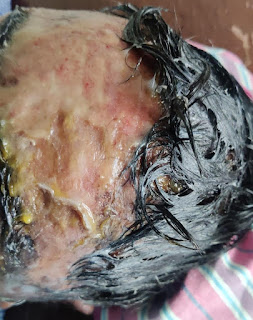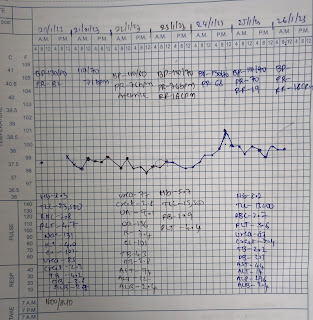GENERAL MEDICINE SHORT CASE
This is an online E log book to discuss our patient's de-identified health data shared after taking his/her/guardian's signed informed consent.Here we discuss our individual patient's problems through series of inputs from available global online community of experts with an aim to solve those patient's clinical problems with collective current best evidence based inputs".
This E log book also reflects my patient-centered online learning portfolio and your valuable comments on comment box is welcome.
MEDICINE CASE DISCUSSION:
I've been given this case to solve in an attempt to understand the topic of "Patient clinical data analysis" to develop my competency in reading and comprehending clinical data including history, clinical findings, investigations and come up with a diagnosis and treatment plan.
Hallticket number:1701006061
CHIEF COMPLAINTS :
weakness of lower limbs since 4days
VIEW OF THE CASE :
He had a history of fall 1 year ago and 4 months back when he developed pain in the right hip region, which was insidious in onset and intermittent at the beginning. Aggrevated on movement and relieved on rest and medication.
He went to the hospital 2 months ago when the pain progressed and became continuous, and was diagnosed with avascular necrosis of the femur due to a trauma to the hip one year ago and given medications
medications:
Tab.Gabapentin&Nortryptyline
4 days ago, patient developed weakness in the lower limb which progressed upto the hip.
He was taken to the hospital and was prescribed medications. On starting the medication, the weakness worsened.
The next morning, patient required assistance to walk and sit up but was able to feed himself. The weakness progressed so that by the evening he was unable to feed himself. He only responded if called to repeatedly.
The weakness was not associated with loss of consciousness, slurring of speech, drooping of mouth, seizures, tongue bite or frothing of mouth, difficulty in swallowing.
No complaints of any headache, vomitings, chest pain, palpitations and syncopal attacks.
No shortness of breath, orthopnea, paroxysmal nocturnal dyspnea, abdominal pain or burning micturition.
Past History:
No similar episodes in the past.
Patient is a known case of diabetes since 12 years. He is on insulin therapy
No history of hypertension, tuberculosis, epilepsy, asthma, thyroid and CAD.
No surgical history.
Personal History:
Diet: Mixed
Appetite: Normal
Sleep: Adequate
Bowel and Bladder: Regular
No allergies
Addictions;
alcohol intake from 25 years 90ml per day
Started smoking from 10 years
Family History:
No similar history in family.
GENERAL EXAMINATION:
Patient is examined in a well lit room after taking informed consent.
Patient is conscious, coherent and cooperative.
He is moderately built and moderately nourished.
Pallor: Present
Icterus: absent
Cyanosis: absent
Clubbing: absent
No generalized Lymphadenopathy
Edema: present
Vitals:
Blood Pressure: 124/72 mmHg
Respiratory Rate: 17 cycles per minute
Pulse: 70 bpm
Temperature: Afebrile
Central Nervous System:
Higher mental functions
• conscious
• oriented to person and place
• memory - able to recognize their family members and recall recent events
• Speech - no deficit
4b) Cranial nerve examination:
I- Olfactory nerve- sense of smell present
II- Optic nerve- direct and indirect light reflex present
III- Oculomotor nerve, IV- Trochlear and VI- Abducens- no diplopia, nystagmus or ptosis
V- Trigeminal nerve- Masseter, temporalis and pterygoid muscles are normal. Corneal reflex is present.
VII- Facial nerve- face is symmetrical, unable to do forehead wrinkling, left nasolabial fold prominent than right.
VIII- Vestibulocochlear nerve- no hearing loss
IX- Glossopharyngeal nerve. X- Vagus- uvula not visualised
XI- Accessory nerve- sternocleidomastoid contraction present
XII- Hypoglossal nerve- Movements of tongue are normal, no fasciculations, no deviation of tongue
Motor system :
Attitude - right lower limb flexed at knee joint
Reflexes:
Right Left
Biceps 2+ 2+
Triceps 2+ 2+
Supinator 2+ 2+
Knee 2+ 2+
Ankle 2+ 2+
Superficial reflexes and deep reflexes are present , normal
Muscles power:
muscle power reduced in upperlimbs and lowerlimbs muscles
Right Left
BULK
Arm
Forearm 19cm 19cm
Thigh 42cm. 42cm
Leg 28cm. 28cm
TONE
Upper limbs N N
Lower limbs N N
Gait is normal
No involuntary movements
Sensory system - all sensations ( pain, touch, temperature, position, vibration sense) are normal
Attitude - right lower limb flexed at knee joint
Tone - Normal on right side
Normal tone on left side
Bulk - Rt Lt.
Arm: cm cm
Forearm 19cm 19cm
Thigh 42 cm 42cm
Leg 28cm 28cm
Cardiovascular System:
S1 S2 heard, no murmurs
Respiratory System:
Bilateral air entry present
normal vesicular breath sounds,no added sounds
Gastrointestinal System:
Soft, non-tender, no organomegaly
ECG :
on 02/06/22
on 02/06/22
electrolytes:
Potassium:2.5meq/L
Chloride:110meq/L
Sodium : 145 meq/L
Diagnosis: weakness due to metabolic cause like hypokalemia
TREATMENT
on day 1
1) tab ecospirin 70mg OD
2) tab atorvas 10mg OD
3) inj NS, RL at 70ml/hr
4) syrup potchlor 15ml/po/tid
5) normal oral diet
6) inj HAI - TID
7) 2 amp KCL in 500ml NS slowly over 4-5 hrs
On day 2
1) tab ecospirin 70mg OD
2) tab atorvas 10mg OD
3) inj NS, RL at 70ml/hr
4) syrup potchlor 15ml/po/tid
5) normal oral diet
6) inj HAI - TID
7) proteolytic enema
8) syrup cremaffine
9) tab spironolactone
On day 3
1) tab ecospirin 70mg OD
2) tab atorvas 10mg OD
3) inj NS, RL at 70ml/hr
4) syrup potchlor 15ml/po/tid
5) normal oral diet
6) inj HAI - TID
7) proteolytic enema
8) syrup cremaffine plus 15ml/po/od
9) tab spironolactone 25mg/po/od
10) tab azithromycin 500mg OD
11) high protein diet
On day 4
1) tab ecospirin 70mg OD
2) tab atorvas 10mg OD
3) inj NS, RL at 70ml/hr
4) syrup potchlor 15ml/po/tid
5) normal oral diet
6) inj HAI - TID
7) tab ultracet QID
8) syrup cremaffine plus 15ml/po/od
9) tab spironolactone 25mg/po/od
10) tab azithromycin 500mg OD
11) high protein diet
On day 5
1) tab ecospirin 70mg OD
2) tab atorvas 10mg OD
3) inj NS, RL at 70ml/hr
4) syrup potchlor 15ml/po/tid
5) normal oral diet
6) inj HAI - TID
7) tab ultracet 1/2 po/ QID
8) syrup cremaffine plus 15ml/po/od
9) tab spironolactone 25mg
10) tab azithromycin 500mg OD
11) high protein diet






.png)







Comments
Post a Comment